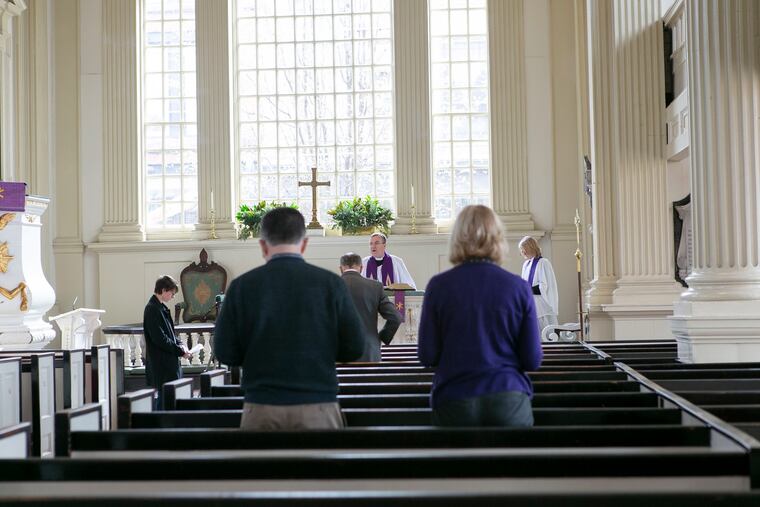Coronavirus changed how Philly worshipers observed Sunday services: ‘Jesus could not practice social distancing’
As the coronavirus outbreak in the Philadelphia region continued to cause unprecedented disruptions across nearly all aspects of daily life, local coregations canceled services, streamed them on Facebook, or created makeshift solutions like drive-through communion.

How does one observe religious services in the age of a global pandemic?
As the coronavirus outbreak in the Philadelphia region continued to cause unprecedented disruptions across nearly all aspects of daily life, local congregations answered that question in a variety of ways Sunday.
The Presbyterian Church of Chestnut Hill was among those that decided to cancel its in-person services. Minister John Wilkinson wrote to congregants that doing so “removes risk and is a good act of pastoral care.”
The African Episcopal Church of St. Thomas in Overbrook Park suspended services, as well, but offered worshipers communion at a makeshift drive-through in the church driveway.
At Christ Church in Old City, where two morning services typically attract about 200 people every Sunday, 17 people showed up to a single prayer service that ended without communion or the passing of an offering plate.
With the start of Shabbat on Friday, Congregation Rodeph Shalom on North Broad Street said it was becoming a mostly virtual congregation, live-streaming services and using video conferencing or the telephone for clergy appointments and tutoring.
And the Philadelphia Archdiocese and the Camden Diocese each relieved the faithful from an obligation to attend Mass, though parishes across the region continued to hold in-person services.
Philadelphia Archbishop Nelson J. Perez, speaking at an 11 a.m. Mass at the Cathedral Basilica of SS. Peter and Paul, called the current situation “unsettling,” and added: “This is a moving target for all of us, whether it’s the archdiocese or our families.”
Still, even as changes were made Sunday to faith-based gatherings, they stood at least in slight contrast to the growing level of isolation that many public officials were urging.
The archdioceses in New York, Boston, Baltimore, and Washington, for example, all suspended in-person Masses for at least this weekend.
Pennsylvania’s Health Department on Sunday afternoon announced an additional 16 confirmed cases, bringing its total number of reported cases to 63. The increase came a day after Gov. Tom Wolf urged nonessential businesses in Philadelphia’s suburban counties to close or curtail operations.
Meanwhile, in New Jersey, Gov. Phil Murphy told a radio host Sunday morning that he was considering implementing a statewide curfew or self-quarantine to try to slow the spread of the virus.
In Philadelphia, Health Commissioner Thomas Farley said at a news conference that officials were not prohibiting religious gatherings but had asked religious leaders to take precautionary measures and limit crowds in all settings to fewer than 250 people.
Managing Director Brian Abernathy added that city officials had recently met with religious groups to discuss steps that organizations could take to help make any gatherings safe.
At Christ Church, in Old City, the Rev. Timothy Safford said he and other church leaders had taken protective steps before hosting a 10 a.m. service — encouraging worshipers to stay home and watch on a live stream on Facebook; discouraging in-person attendees from sitting close to one another by flipping up cushions on a majority of the rows of pews; forgoing communion or passing around an offering plate; and canceling in-person activities during the week.
As Safford began the service with a nod to the unusual circumstances, he spoke about the need to continue to keep the vulnerable in mind even as people continue to self-quarantine.
“Jesus,” he said, “could not practice social distancing.”
The historic church has been holding services every Sunday since Nov. 15, 1695, Safford said afterward, and he planned to continue doing so next week. He said the church would not close its doors for those services, but would encourage people to stay home and be mindful of maintaining connections while isolated.
The situation “breaks our heart,” Safford said. But he added: “You don’t need a physical location to worship God.”
In Overbrook Park, at the African Episcopal Church of St. Thomas, all church-sponsored activities and events had been suspended until further notice. But the Rev. Martini Shaw donned latex gloves and offered the sacrament to congregants during a drive-through service, giving them hand sanitizer before offering communion and a blessing.
Shaw said he came up with the idea because “I felt that we still needed to provide an opportunity for parishioners and others to receive the sacrament, and to receive prayers and blessings.”
A carport that traditionally provides cover for the elderly and disabled to enter the church instead became a thoroughfare for congregants, Shaw said. Each guest’s windshield was washed — a “cleansing of the visual path,” Shaw said — before they were given communion and a subsequent blessing.
In total, Shaw said about 150 people came through, many of whom expressed appreciation for continuing to find a way to keep up a tradition that many parishioners find a central part of their lives.
Shaw said he plans to continue the exercise each week until normal church operations resume.
“It may not be good or recommended to get together,” he said. “But that doesn’t mean the church has no purpose. It has even more of a purpose now.”
Staff writer Aubrey Whelan and staff photographer Michael Bryant contributed to this article.